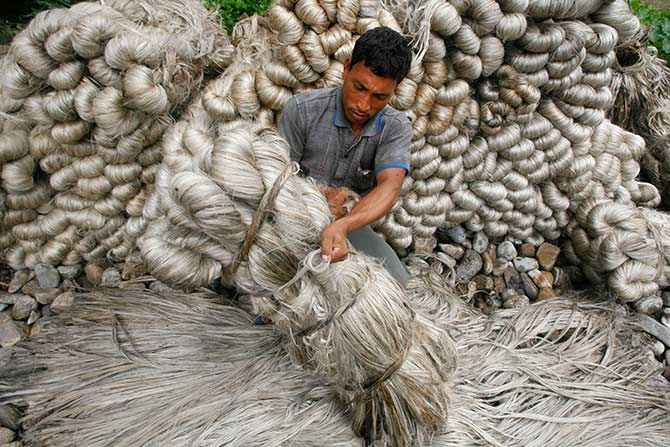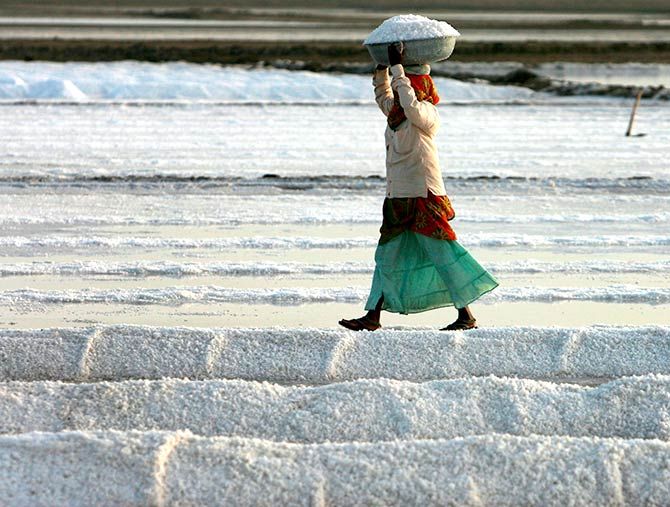Tea plantation workers.
Jute workers.
Salt pan workers.
And other labourers like them who are paid their salaries in cash.
As the first salary date after demonetisation arrives, will they be able to take their hard earned wages home?

Cash crunch brews trouble for tea plantation workers as inadequate banking infrastructure proves to be a major bottleneck, report Avishek Rakshit and T E Narasimhan.
Payments to labourers in tea plantations are likely to be delayed after demonetisation.
In Assam, producer of 55 per cent of the country's tea, the state government has directed that bank accounts be opened for each worker, where their weekly or fortnightly wages could be credited directly.
However, progress has been slow.
Garden owners say about half the 800-odd estates in the state are in remote areas and serviced by a five-employee bank branch.
At the most, these gardens can open 50 accounts a day; the worker strength is about 500,000 in all.
In the southern growing states of Kerala, Karnataka and Tamil Nadu, inadequate banking infrastructure is also a major issue.
In Assam, of the three major public sector banks operational in the gardens, the State Bank of India (the others are UCO Bank and United Bank of India) has started installing ATMs, but the official (government) target of December 5 seems unlikely.
"Once the account is opened, getting it operational is another problem. Imagine the queue outside the single functional ATM in the estate on payment day," said Arun Thekedath, chairman, Assam Tea Planters Association.
The arrangement now is that plantation owners deposit the required cash in the account of the district collector/magistrate and get the equivalent cash to disburse as wages.
However, in West Bengal, the Reserve Bank of India has asked the gardens to modify this and disburse the salary directly.
It has worked out a limit for the gardens to draw cash from their current accounts to pay workers each fortnight, at 2.5 times the garden area multiplied by Rs 1,400.
"This is not workable for most of the big gardens, which are labour-intensive. As a result of demonetisation, the availability of money with banks is limited," S S Bagaria, chairman, Darjeeling Tea Association, said.
In the three southern states, many plantation owners have opted to partially pay the workers in cash and use the residual amount to help them buy rations and provisions.
However, Kerala is now shifting to the Assam model of routing the payment through the district collector to the gardens.
Karnataka is considering it.
An industry official said, "We are ready to give permissions and adjust one day for the benefit of workers but if they go to the banks, they are turned down as banks and ATMs don't have cash."

Jute workers aren't enthused about e-payments, reports Jayajit Dash.
Despite the jute sector's attempt at paying wages to its 250,000-odd workers through electronic transfer to their bank accounts, a section of the workers are likely to face hardship as they don't have bank accounts.
Even those with bank accounts insist on receiving payment through cash as they don't want to go through the trouble of queuing up at bank ATMs to withdraw money.
"We have attempted to overcome the prevailing crisis by crediting wages to the workers' bank accounts. But the jute workers want lump sum wages on a fortnightly basis. The present limit on cash withdrawal at banks will not ease their woes," said a mill owner, who did not wish to be identified.
On an average, a jute worker earns Rs 400 a day.
Eighty per cent of the 250,000-odd jute workers in producing states are concentrated in West Bengal.
Before de-monetisation, workers used to get their wages in cash while miscellaneous payments such as provident fund were done through cheques.
The other challenge for the jute industry is to ensure payments to workers who don't have bank accounts.
This category, which constitutes around 10 per cent of the total workforce, comprises floating workmen hired by agents.
They are unregistered and don't have the requisite documents to open bank accounts.
Raghav Gupta, chairman, Indian Jute Mills Association, said: "For the unregistered workers, we are holding special camps to open bank accounts. Payments to around 80 per cent of the jute workers have already been made and the rest will be covered shortly."
Gupta admitted the raw jute trade revival remains a matter of concern due to squeeze in supply of currency notes.
"Unless the JCI (Jute Corporation of India) takes up commercial jute operations, the revival of raw jute appears bleak. Paucity of cash has affected trading, but we are trying to sort it out," he added.
Normally, raw jute trade worth Rs 400 crore is transacted between November and January of each crop year. But the ban on old currency notes has crippled trading. Only 35 per cent of the raw jute has been procured till date.
Traders were unable to procure the new crop or take delivery of raw jute booked earlier as cash had dried out.
Being a cash-dominated business, jute trading had plunged into a crisis despite the availability of nine million bales (one bale is 180 kg) to meet the domestic demand.
To tide over the crisis, IJMA has suggested that the Union ministry of textiles provide adequate capital to finance raw jute purchase on a commercial basis by JCI.
Although IJMA has not divulged the figure, an industry estimate pegs the fund size at Rs 400 crore.

Saltmakers are in a hurry to open bank accounts for their labourers in order to salvage production, reports Vimukt Dave.
The cash crunch arising due to demonetisation has led to salt manufacturers opting for cashless transactions.
To avoid a liquidity crunch ahead of paydays, salt makers are hurriedly opening bank accounts of direct and contractual workers so that they can deposit their salaries.
The industry fears that a delay in payment of salaries may impact production as workers may not resume work at manufacturing facilities, leading to at least a 10 per cent loss in overall production.
The salt production season is begins now, post monsoon.
"Usually we pay labour contractors by cheque and they will pay wages to workers in cash.
"There are about 400,000 workers associated with the salt industry across India and, of it, nearly 75 to 80 per cent are migrant workers. If we don't make timely payment of salaries, it may lead to a temporary shut down. Hence, salt manufacturers are now opening bank accounts for the workers," said Bharat Rawal, president, All India Salt Manufacturers Association.
According to Rawal, the association has discussed with district collectors and banks the option of camps for opening accounts, even as salt units are willing to help workers in availing necessary documents for the same.
Labour contractors say the biggest issue with migrant workers is that they do not carry the appropriate documents with them.
"Documentation is a difficult task. We are trying to manage it and have been asking workers to collect the same from their home towns. It will take some time but, with the support of salt manufacturers and banks, we are trying to manage it," said Suresh Kumar, a labour contractor in the Kutch area.
India produces 27.6 million tonnes of salt a year. Of this, 11.4 million tonnes is used for industrial purposes, six million tonnes is for edible use and 6.6 million tonnes is exported.
Gujarat is the major producer, at 22.7 million tonnes a year, followed by Rajasthan at 2.4 million tonnes and Tamil Nadu at nearly two million tonnes.
"We have already started the process for cashless transactions. We have started opening bank accounts for our workers and also providing supportive documents to banks for our workers.
"As of now there is no issue as far as supply is concerned and prices may remain stable in the current scenario," said G S Jhala, chairman and managing director, Dev Salt Private Limited.
According to end user industries of salt, such as caustic soda and soda ash players, the demonetisation has so far had little impact on the industry.
"Demonetisation is good move and we welcome it. In the long run it will be beneficial for everyone, including workers. The supply of raw salt is sufficient as on date and we have no issues with the same," said R S Jalan, managing director, Gujarat Heavy Chemicals Limited, a leading caustic soda and soda ash producer.












 © 2025
© 2025